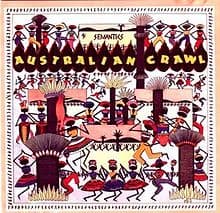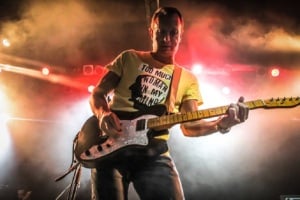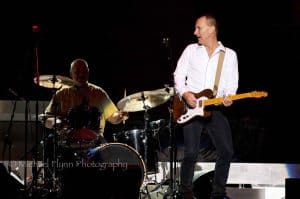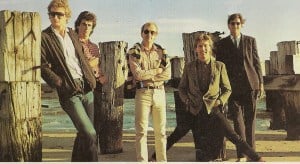James Reyne: Rockin’ With Rod (Interview)
Aussie rocker James Reyne is in Auckland to open the show for Rod Stewart’s two concerts at The Vector Arena. The former front man for Australian Crawl has been busy on his own, recording with his band, The Magnificent Few. The 13th Floor’s Marty Duda spoke to James Reyne recently about the prospect of opening for Rod Stewart and how he would compare the Australian and New Zealand music scene of the late 1970s.
Click here to listen to the interview with James Reyne:
Or, read a transcription of the interview here:
MD: So you’re coming here to open for Rod Stewart, is that right?
JR: That’s right. We’re doing the Australian tour and the New Zealand tour as well. So Australia and New Zealand with him.
MD: Very good.
JR: It should be fun. I’m looking forward to it. I’ve never met, I know Dave, his drummer, well I knew Dave a long time ago. So I have a vague connection with the band.
MD: Right.
JR: But I think it’ll be great. He seems like a charming kind of person. So I’m sure it will be great fun.
MD: Do you usually get a chance to have much interaction with the headliner in a situation like that or are you….
JR: Well I haven’t done too many of them to be really honest. I think it depends on the person, you hear these stories, I mean other people I know who do what I do and have done tours and you hear stories of sometimes people are really approachable and sometimes they don’t really ever get to meet them. The only other one I can think of, Mark Seymour who was a singer in Hunters & Collectors and I, did a run with John Fogerty from Creedence Clearwater Revival and they were great, the band was fantastic and they were all really approachable, his crew were great and often it can be the crew who can be a bit grumpy.
MD: Yeah.
JR: I haven’t done too many of these so I don’t really know. A long, long time ago we toured the East Coast and the South of America with Robert Palmer.
MD: Oh right.
JR: And didn’t meet him at all, I didn’t meet anybody. I think I saw Robert once in the distance in a room, that’s the closest I got to him, not that he was trying to stay away, I think that it just depends on the circumstance.
MD: Right. So you toured The States with Robert Palmer, that must have been..
JR: Yeah. We did all the East Coast and all through the South.
MD: Right. I guess, I mean being American, I remember Australia Crawl, I was working in radio back in the late 70s and early 80s and all that but they never really broke through over there did they? Is it just the innate Australian-ness of the music do you think that was the cause of that?
JR: But there have been some very Australian bands broke, I mean Midnight Oil are a pretty Australian band and they broke through. I think it’s just, a lot of it is luck of the draw, I think perhaps sometimes… we had a record deal, we were signed to  Geffen Records and we had, Tommy Mottola was our manager. But it just didn’t seem to happen, I think there might be someone at the record company who’s keen and then they leave or I don’t know. Then I got close with my first solo album, they had big hopes for that in America cause’ I was signed directly with Capitol Records in America.
Geffen Records and we had, Tommy Mottola was our manager. But it just didn’t seem to happen, I think there might be someone at the record company who’s keen and then they leave or I don’t know. Then I got close with my first solo album, they had big hopes for that in America cause’ I was signed directly with Capitol Records in America.
MD: Yeah.
JR: But again, sometimes it just doesn’t take.
MD: Yeah.
JR: Sometimes it does, sometimes it doesn’t. I mean my first solo album went Top 10 in Boston and Top 10 in Miami and that was it. They had hopes for it, “On if we could break out of Boston, we’ll break out of…”
MD: Right.
JR: Out of Miami. Then that didn’t really happen.
MD: Now for the shows that you’re doing with Rod Stewart, are you doing newer material cause’ I noticed that you were working on a EP or something and you have a new band, but then I’ve also read that you’re doing kind of Crawl music as well, so.
JR: The band that we’re recording with, we’re going to finish recording at the end of April in Melbourne.
MD: Right.
JR: That’s my band and we’re just giving it a band name. When we do the Rod Stewart stuff, it’ll will be all stuff that people know, it will be a mixture of Crawl, my solo stuff and I did a couple of other things that did well, certainly over here, I can’t remember how well they did in New Zealand, but we’re got 45 minutes.
MD: Yeah.
JR: It’ll be a tight 45 minutes. So it’ll be probably just bam, bam, bam, just bang out the songs. But there’ll be songs that everybody knows, it would be all the sort of, so called mixture of all the hits.
MD: Yeah. We just had the Eagles here a couple of days ago and I just got off the phone with one of the guys who used to sing with Dr. Hook and it’s a lot of talking with guys who have been making music for a long time and it’s interesting to see or hear how they kind of grapple with their past, they still want to make new music and people want to hear the old songs and I know you kind of dealt with that last year in Australia. Is it something that is a constant with you that you have to kind of think about and kind of re-evaluate?
JR: Yeah you have to. It’s striking that balance between doing the stuff. Look, a lot of the old ones, I love doing, I’m not going to lie about it, but I think its striking that balance between what you’re doing and what you want to do, usually what you want to do is the latest stuff you’re doing, the most recent.
MD: Sure.
JR: The song you like the best is the one you just wrote usually.
MD: Right.
 JR: So it’s striking the balance between doing enough of that to satisfy yourself but the bulk of it’s got to be essentially what people wanna come hear and I understand that. I went and saw the Eagles, not this time but the last time, and I go and see the Eagles, I wanna hear all the stuff I love about the Eagles. I’ve kept up with them with the bit more recent things, so I quite like seeing the recent stuff, but I want to sing along and get teary and do all that stuff cause’ I’m just a dear old thing. So it is, it’s a constant thing because as a creative craftsman, I suppose, well I certainly am, I’m always writing songs, I’m always working on something, so I’ve always got songs and every couple of years I put out an album of new things. So it is, it’s just striking the balance. But I found if you do 2 old ones, a new one, 2 old ones, you can often get away with it like that.
JR: So it’s striking the balance between doing enough of that to satisfy yourself but the bulk of it’s got to be essentially what people wanna come hear and I understand that. I went and saw the Eagles, not this time but the last time, and I go and see the Eagles, I wanna hear all the stuff I love about the Eagles. I’ve kept up with them with the bit more recent things, so I quite like seeing the recent stuff, but I want to sing along and get teary and do all that stuff cause’ I’m just a dear old thing. So it is, it’s a constant thing because as a creative craftsman, I suppose, well I certainly am, I’m always writing songs, I’m always working on something, so I’ve always got songs and every couple of years I put out an album of new things. So it is, it’s just striking the balance. But I found if you do 2 old ones, a new one, 2 old ones, you can often get away with it like that.
MD: So that’s the formula.
JR: Yeah, yeah. Maybe I’ve heard that before, I like that one.
MD: Yeah. I mean it’s got to be satisfying to be able to appeal to folks on both ways because obviously that’s what it’s all about.
JR: I’m lucky certainly in Australia that I have enough of a core following that they keep up with the new stuff, so.
MD: Yeah, and what about in New Zealand. Have you been over here much as a solo artist and touring when you do put out new stuff?
JR: Not for new stuff recently, no. I don’t know how much radio…again, a lot of it’s down to radio support. I don’t know how radio necessarily works, I imagine it works the same way it does here, that the mainstream, contemporary pop music stations play stuff that my kids listen to.
MD: Yup.
JR: And they’re not necessarily going to play new things by someone who’s been doing it for 30 years like me.
MD: Yeah.
JR: Not necessarily, there are the exceptions. So I played in New Zealand quite a lot over the years, so I’ve kept up a vague profile there, I guess.
MD: Yeah.
JR: But I think I’m probably more known for the Australian Crawl stuff then my earlier solo stuff.
MD: Right. Now the new band that you’ve got is called Magnificent Few, is that right?
JR: Well that’s what we’re going to call it. It’s the band that I’ve been playing with for years and years and years.
MD: Right.
JR: That’s my band. We’re going to make a record, we’re just giving it that name. So it’s me and the Magnificent Few, I’m using the band on the record. The last few records I’ve made, I’ve just made, essentially by the engineer, the producer/ engineer that I’ve been working with and between us we try and play everything and we program drums and then if we need special people to come, we bring them in.
MD: Right.
JR: On a need to know basis so to speak. But this time I thought I’d just use the band and we’ll go in and we’ll just do it, give the band a name it might identify it.

MD: Yeah. Does it make a difference to you, kind of somewhere in your mind, your sub-conscious, that you’re part of a band as opposed to your name out there instead?
JR: I like being part of a band, I like being just sort of this singer in the band in terms of how we call relate to each other even though they’re essentially my songs, well they’re all my songs.
MD: Right.
JR: But I’m so used to being the solo guy, I don’t even think about it really, but on stage I just feel like I’m part of the band.
MD: Right.
JR: So anyone else is just as important as I am.
MD: So really there are two essential parts to what you do I would say which is singing and song writing and you’ve been doing both of those for a very long time. Either the process of either those things changed very much over the years for you, are you the same kind of singer that you were in 1980…song writing-wise, how do you approach it now as opposed to then?
JR: Well I think I’m definitely, I’m quite different as a singer. The late 70s, when I made those first records I didn’t know what I was doing.
MD: Right.
JR: I hadn’t really been the in the studio that much, so it’s kind of barely controlled yelling really. Now I know I’m sort of a better singer cause’ I’ve worked on it and I’ve done it for a long time and the craft of singer, I just understand the voice and what I can do with it and what I can’t do with it and I think it’s developed just because I’ve done it and it’s the same as song writing. I think more of the songs back then you just went, “blahhh”, just let them out.
MD: Right.
JR: Some songs you just sort of let out now but I think now I’m better, I’m still learning bit better at the craft of it. Just trying to better myself all the time cause’ I like doing it. It’s something I’ve sort of grown to really quite like doing, I like the process, I like the challenge of it, I like the creative challenge of trying to get something, when you have a germ of an idea and just developing that idea into something that might be worthwhile, so I quite like that challenge.
MD: I was going to say, is it more of a challenge now than it used to be or is the challenge pretty much stayed constant?
JR: No it was more of a challenge then because now there’s no pressure and I enjoy it. Back then, I wouldn’t mind being in that position where you’ve got a record company hounding you because they’re making so much money from you.
MD: Right.
JR: But now I can provide it. I can go, “whoa, I’ve got10 songs I can throw at you, whereas back then you’re sort of going, “oh God!”. So often times there’d be things that, there were some good songs there but sometimes, some of them when I hear them now, you know what that could have been made a bit better, I know what I’m doing now, I would have changed that bit and don’t that but you know.
MD: Yeah.
JR: But I never really felt any pressure, you just got to do what you do, I think.
MD: Yeah. Well we just had the band Jesus Jones play here and they played one of their albums in their entirety and they came upon one song in the album that apparently they’ve been uncomfortable with when they came back to revisit it and pretty much rewrote the song because they announced ‘sorry guys, but this was not up to snuff when we did it so 20 or 5 years later we’ve decided to work on it a little bit more’. So I guess there is that kind of, with hindsight, you can kind of look back and go wait a minute we need to …

JR: Oh yeah. We just did the tour of, cause’ we can never put Australian Crawl back together. We just did a tour where we were doing a lot of those songs, it was me singing those songs and there were a couple in there, and I just tell crowds saying this is horrible, crappy song I’m embarrassed by it. One in particular, I get the audience to sing most of it because I can’t stand singing it frankly this is an un-singable song, this is written by a 17 year old guy trying much too hard.
MD: Right. But everybody else loves it. So there you go.
JR: I’m lucky that a lot of people, well certainly in Australia, seems a lot of people do and they sing along and I just get them to sing it. It makes life a lot easier for me.
MD: Yeah. I was hoping maybe you can just briefly touch on the Australian Rock scene in the late 70s when you kind of got started cause’ especially compared… a friend of mine who’s kind of a musicologist from New Zealand, he was telling me recently that he felt that compared to New Zealand the Australian scene is a lot harder edged, a lot more rock oriented, whereas the New Zealand scene at the same time was kind of softer, I guess. How would you describe what was going on when you got your start?
JR: Well I think it was interesting because I think, well certainly as we sort of moved more into the very early 80s cause’ I remember when the pub scene in Australia was very strong so you had these massive beer bars which would hold up to 2000 people sometimes.
MD: Yeah.
JR: And you’d be working 6 nights a week for 10 months of the year cause there were so many of them there, a lot of bands, you fill these places, people wanted to, they used to call it raging, they wanted to rage. So that’s why there’s big beaty kind of pub, what they call pub rock now but it wasn’t called that back then, kind of developed and I think… but I think a lot of the New Zealand stuff and I’m thinking, bands like Split Enz, Hello Sailor and a lot of those bands much more influenced by English music cause’ I think in Australia it’s much more bluesy kind of stuff. I think they might have had…I’m talking about the early to mid-70s which certainly influenced a lot of the bands of my generation cause’ that, early to mid-70s, well certainly mid-70s when we were all going out watching bands all those guys that started bands. So I think we’re probably influenced and when you play in these places you got a massive moving, sweating behemoth of people you got to get them off. So with the songs, you tend to kind of go a lot harder I think.
MD: Yeah.
JR: There’s a different sort of, I know that theres, I can feel the differences in Sydney and Melbourne but I think the New Zealand thing was much, I thought it was a lot more intelligent, I meant not to put down any Australians but it was much more quirky, much more English influence I think.
James Reyne opens for Rod Stewart tonight at Auckland’s Vector Arena
- Civil War – Dir: Alex Garland (Film Review) - April 9, 2024
- Pearl Jam – Dark Matter (Monkeywrench/Republic) Album Review - April 1, 2024
- Blonde Redhead – New Zealand Tour 2024 - March 14, 2024
